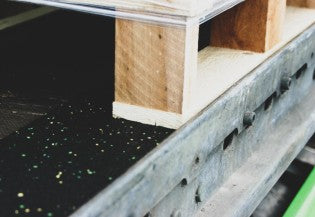Free Coefficient of Friction Table and Explanation
November 20, 2023 – Matthew Neumeier

What is Friction?
Surfaces moving past each other have a certain amount of friction. The degree of friction is expressed as the coefficient of friction. The coefficient of friction indicates the friction between two surfaces; in other words, how easily one material can slide over the other.
This is expressed in a number: a larger number indicates higher friction.

Static and dynamic friction
For rough materials friction is high and for smooth materials low. In formulas, the coefficient of friction is represented by the Greek letter mu (µ).
The normal force is the force by which surfaces are pressed against each other. When it comes to cargo lying on a loading floor, it is therefore equal to the mass of the cargo. The normal force is always perpendicular to the load surface and is expressed in formulas as FN.
- The static coefficient of friction (µs) is the ratio between the maximum frictional force before the surfaces start moving relative to each other and the normal force.
- The dynamic coefficient of friction (µd) is the ratio between the friction force and the normal force when the surfaces are moving relative to each other.

Table of coefficients of friction according to EN 12195
Here is a table of coefficients of friction of various materials. These indicate the coefficients of friction of two materials when sliding past each other.
Thanks to their high coefficient of friction, anti-slip mats are very suitable for securing cargo (µs 0.6). A crate or box may tend to slide across the loading floor, but with an anti-slip mat underneath, this tendency is already much reduced. Lashing down can further reduce the tendency to slide.
| Material Type | Specific Material | µs |
|---|---|---|
| Plastic pallet | Laminated plywood | 0.2 |
| Plastic pallet | Grooved aluminium | 0.15 |
| Plastic pallet | RVS sheet | 0.15 |
| Steel crate | Laminated plywood | 0.45 |
| Steel crate | Grooved aluminium | 0.3 |
| Steel crate | Stainless steel sheet | 0.2 |
| Raw concrete | Sawn timber beam | 0.7 |
| Smooth concrete | Sawn timber beam | 0.55 |
| Element part | Steel reinforcement | 0.65 |
| Element part | Element wall | 0.55 |
| Element part | Element wall | 0.59 |
| Concrete on wooden beams | Wooden loading floor | 0.54 |
| Steel frame | Wooden loading floor | 0.43 |
| Paper products | Material | Packed | Unpacked |
|---|---|---|---|
| Paper roll | Laminated plywood | 0.32 | 0.27 |
| Paper roll | Laminated plywood with JOLODA | 0.27 | 0.38 |
| Paper roll | Metal loading floor | 0.32 | 0.32 |
| Paper roll | Plastic | 0.27 | 0.16 |
| Paper | Paper | 0.43 | 0.43 |
| Paper | Wood | 0.43 | 0.49 |
| Beverage products | Material | µs |
|---|---|---|
| Plastic soft drink crate | Wooden pallet | 0.32 |
| Stainless steel barrel (30l, 50l) | Wooden pallet | 0.49 |
| Other | Material | µs |
| Mesh reinforcement | Mesh reinforcement | 0.22 |
| Straw bales | Loading floor made of planks | 0.49 |
| Straw bales | Laminated plywood | 0.38 |
| Straw bales | Straw bales | 0.43 |



